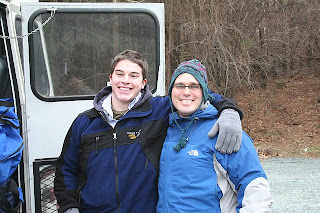By: Reynolds Chapman
Two and a half years ago, Hurricane Katrina submerged the city of New Orleans beneath 12 feet of water. Most of us remember the horror of the media reports, hearing accounts from shocked survivors and watching the number of deaths climb steadily by the hour. Katrina was one of the most destructive and deadliest natural disaster in the history of the United States, leaving a debt of over $81 billion and an estimated death toll of 1,836. After the waters cleared, tens of thousands of residents were displaced. When the storm hit, it stole the attention of America as it stole the homes of those who lived in the city.
Last month, about a dozen Trinity Fellows and about a dozen Reformed University Fellowship (RUF) students from the University of Virginia had the opportunity to represent Trinity in serving New Orleans by working on building a house in the St. Bernard district. Many of us had seen the city since the storm hit—some multiple times—and some of us, such as myself, were visiting the city for the first time. As I was preparing for the trip and during the 18-hour drive from Charlottesville, I wondered what kind of significance such a trip, almost three years after the storm, might have for each of us, for New Orleans and for the people of Trinity and Charlottesville to whom we would tell stories upon our return.
The impression New Orleans left on us can be summed up in an insight we heard from Ray Cannata, pastor of Redeemer Presbyterian Church of New Orleans, where we worshiped during our stay. Pastor Cannata said, "In New Orleans, on the one hand you see a vivid picture of the Fall, and on the other hand you see a clear picture of Redemption." One can see the brokenness in a variety of forms, such as with the memory of when Katrina hit, a time filled with fear, desperation and loss. Although it has receded in our memories for the most part, it is not as easy to forget for those from the city—those who lost their homes or loved ones, or who drive every day through the wreckage that remains to be rebuilt. Most residents know someone who was killed in the storm, and many are waiting for their friends and family to return to the city.
We also see a picture of the Fall in the apathy that has left much of the city and people still abandoned, particularly the poor. Driving through the lower Ninth Ward, seeing uninhabited houses with yards overgrown and boards on the doors and windows, was unnerving and elicited feelings of anger and disappointment as we imagined the families that once lived there. For us, just one week in a place where the memories and aftermath of the storm are experienced on a daily basis was eye opening—it took us out of our world and put us in theirs. I realized the people who looked Katrina in the eye have a greater understanding than I do of the reality that, as theologian Cornelius Plantinga puts it, "The world is not the way it's supposed to be."
After spending a week in New Orleans, I realized that when Pastor Ray Cannata said New Orleans presents a lucid portrait of redemption, it wasn't a sentimental "looking on the bright side." We were able to truly experience the vibe of hope in the city. When we arrived, both the church and the Habitat for Humanity camp where we stayed received us as though we were their first visitors, thanking us incessantly and taking a sincere interest in our own stories. If "The Big Easy" had arms, they would be wide open. It seemed that feasting and socializing were the two main activities for the people there. From potlucks at people's houses, to restaurants in the French Quarter, to music and dancing on Frenchman Street, many of us found New Orleans to be one of the most people-oriented, vibrant, culturally rich communities we've ever visited. Ray Cannata told us the hurricane did not take away from the sense of community in the city, but rather heightened everyone's appreciation for one another and brought people together.
The rebuilding efforts have also been a sign of hope in the city. There has been a consistent flow of volunteers since the hurricane hit, and it was exciting for us to be able to lend a hand by working with Habitat for Humanity on a house-building project. It took some of us a few crooked nails and bruised thumbs to get our hammer skills down, but we had fun getting our hands dirty. We stayed at Camp Hope, where we ate meals and shared conversations with people from many walks of life, all coming to help out. It was a great opportunity to testify that Christ was our reason for being there. And perhaps one of the most encouraging statistics I heard was that 80-90 percent of the rebuilding efforts were done by churches. The kingdom of God is indeed at work.
Pastor Ray Cannata mentioned that the good and the bad of New Orleans were certainly present three years ago—the storm just exposed them. This reminded me that the effects of the Fall and the Redemption of Christ are present in every city. If there's anything to take home from New Orleans to Charlottesville, it is this clear picture of Christ entering into a broken world to redeem it. So we thank God that while we were able to contribute to the rebuilding efforts in New Orleans, we also left with a challenge to be the Church who enters in, and brings redemption through Christ, to the broken areas in our home, the city of Charlottesville. We thank God that Trinity Presbyterian Church cares enough to enter into the brokenness of the world, New Orleans and our own backyards, and we pray that He would continue challenging us to meet this call.
Should you wish to hear more about the New Orleans trip or other service opportunities the Fellows are involved in please email me at reynoldschapman@gmail.com










